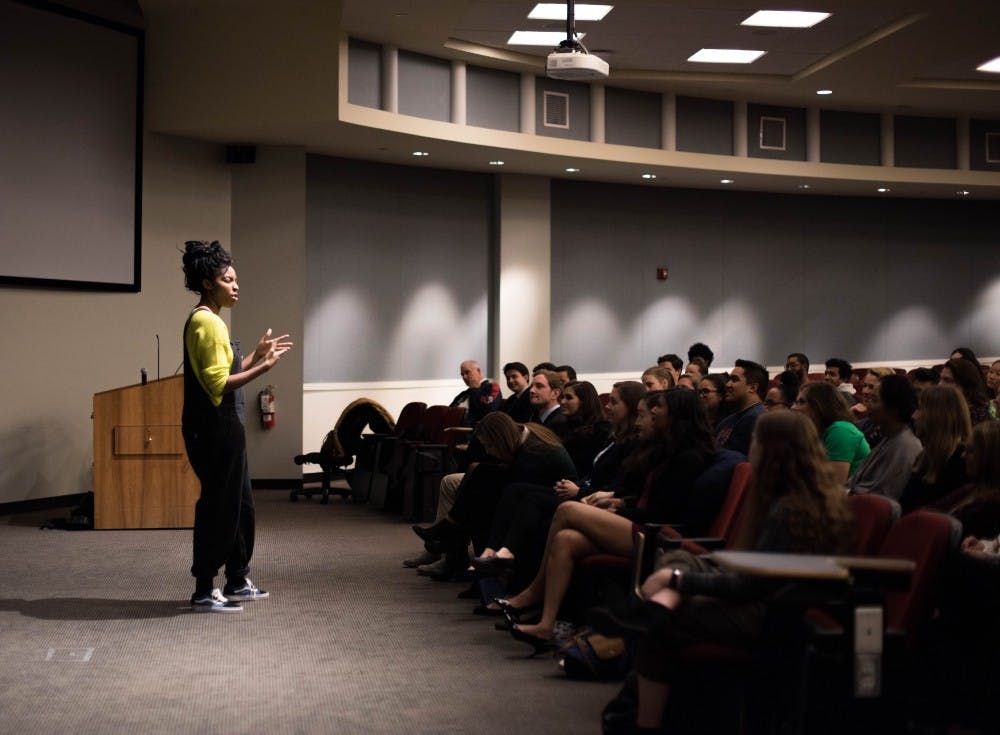Actress and comedian Jessica Williams addressed a packed auditorium in Hodson Hall on Friday as a part of the Milton S. Eisenhower (MSE) Symposium speaker series.
Williams was the first African-American woman and youngest correspondent on The Daily Show to date. She currently co-hosts the podcast 2 Dope Queens, and will appear in the upcoming movie Fantastic Beasts: The Crimes of Grindelwald.
In her set, Williams talked about auditioning for The Daily Show, her experiences with her mental health and her experiences as a woman of color in the U.S.
Alejo Perez-Stable Husni, an MSE co-chair, appreciated that Williams discussed such serious subjects in a fresh light.
Perez-Stable Husni believes that Williams’ run on The Daily Show has shown that she is unafraid to address topical societal issues.
“Sometimes comedians can be the best commentators on society. Williams is interested in a lot of the tensions that we find in American culture today. She blends all of this together in a way that makes it colligative social commentary but also just comedy,” Perez-Stable Husni said.
Williams specifically discussed her experience with anxiety, obsessive-compulsive disorder (OCD) and attention-deficit/hyperactivity disorder (ADHD). Interspersed throughout her talk were anecdotes about her childhood and personal life.
Sophomore Tejasvi Desai appreciated both the setting and tone of the talk.
“I enjoyed how casual and intimate it was. On The Daily Show, the correspondents are playing a character, and so when she talked to us it was personal and real,” Desi said.
Desi believed that the way Williams talked about mental health issues helped to remove the stigma that surrounds it.
“She was very upfront and wasn’t trying to hide anything. The way she talked about her mental health made it seem like it was normal, which I think was the point,” Desi said.
Williams opened with a comedic vignette about a socially awkward encounter with a van driver. She connected that story to her struggles with anxiety.
Vikram Chandrashekhar, a graduate student, felt that Williams’ comedic framing of sensitive issues was well-balanced.
“You can joke about these issues in the wrong way, but the way that she approached it, she wasn’t punching down on people who have to deal with mental issues. It was a way of coping with her own struggles in a way that other people can appreciate,” Chandrashekhar said.
Williams went on to describe her childhood, particularly the time she spent with her grandmother. Williams’ grandmother grew up below the poverty line. She explained that her grandmother was her role model and comedy inspiration.
Then Williams recounted an incident with her mother upon receiving her middle school report card. Williams told her mother that the Cs on her report card indicated that she was average. Her mother stressed that as a black woman, Williams would have to overcome more obstacles and, as a result, would have to be better than average to achieve her goals.
Sophomore Siddharth Iyer compared Williams’ talk to a roller coaster.
“She took the audience through the ‘highs’ of levity and laughter but also took them through the serious ‘lows’ of topics like race relations which are important to grapple with,” Iyer said.
Iyer acknowledged that since many Hopkins students come from privileged backgrounds, it may have been difficult to relate to the Williams’ story. Yet, according to Iyer, by discussing her grandmother’s poverty alongside universal themes like grandmotherly love and family outings, Williams managed to connect with her audience.
“Framing those topics in terms of the common human thread makes it more familiar to all of us. While they may have been unfamiliar at first, after she began talking about it, I don’t think they were unfamiliar at all,” Iyer said.
Sophomore Thomas Mazumder was moved by Williams’ story.
“She painted a very vivid picture. I saw, and I think many audience members saw, that sentiment reflected in their own families,” Mazumder said.
Williams also spoke about race relations, particularly the portrayal of race in media. Williams also mentioned the near-constant anger she feels when she sees injustice in the news or everyday life.
Jordan Britton, a recent graduate, said that he could relate to the anger that Williams described.
“That anger is something I identify with. It is a rage that many marginalized groups feel. It is not directed at one thing; it is directed at the system,” Britton said.
Williams also emphasized the importance of the presence of minority voices in comedy. According to Iyer, those who are only exposed to mainstream comedians may be missing an important perspective on social issues.
“I need to take a closer look at the media I consume and the biases that they project,” Iyer said.
Overall, students like Britton felt that the talk was personal and engaging.
“Her identity as a black woman shined through when she was a correspondent and when she was here. She wasn’t afraid to say anything that made people uncomfortable in a way that is constructive to that person and will help them move forward. She seems so authentic and genuine,” Britton said.





